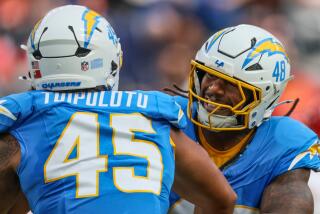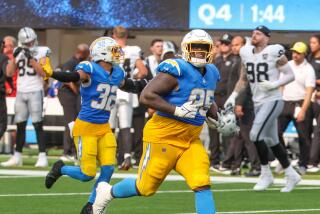D-Rock Is on a Roll for Chargers : Rookie Brinson Secures Spot Left by Little Train
SAN DIEGO — You are about to enter the wild and imaginative world of D-Rock.
“That’s D-hyphen-R-O-C-K,” says Dana Brinson.
D-Rock is not a video game or an amusement park ride, a dance or a drill bit. D-Rock is more of a concept than a personal nickname.
“They called me D-Rock,” says Dana Brinson, who will join the rest of the Chargers for their final exhibition tonight at home against Phoenix, “because I was solid.”
That was in college at Nebraska. And in high school. D-Rock hasn’t exactly caught on yet here. But when the Chargers cut Lionel (Little Train) James on Saturday, the message was clear: Brinson, they had decided, was the answer, a faster and bigger locomotive.
D-Rock could have told them that himself.
D-Rock features a diamond stud and a loop in his left ear. But D-Rock leaves the gold chains to his Florida boyhood friend, Neon Deion Sanders. Still, Charger receivers coach Charlie Joiner winces every time he looks at the loop.
And, says D-Rock, “I just keep asking the question: Why can’t I be myself and have my own identity?”
D-Rock’s tongue is almost as quick as his feet. And he needed all of the latter to bail out the former at practice in August when the Charger veterans decided D-Rock was nothing more than a rookie with an attitude.
Little Train was extremely popular among his former teammates. So when D-Rock started talking trash in the newspapers, it didn’t sit well with Little Train’s allies.
Five-foot-9, 170-pound D-Rock said 5-6, 170-pound Little Train was complacent. D-Rock said he was just as good or better than Little Train. D-Rock, an eighth-round draft pick, said it would make sense for the Chargers to keep him on the roster. He would cost less.
Watch out, D-Rock warned Little Train.
Watch out yourself, a couple of younger Chargers warned D-Rock the day his remarks were published. What followed was every rookie’s worst living nightmare.
Tell it, D-Rock:
“Some of the guys came up to me before practice. They had overheard what other guys had said. They just came up to me and said, ‘Watch your back. Some of the guys got it out for you.’
“I didn’t really know what had gone on because I hadn’t read the article. So I went out on the field, and it was like, I mean, the ball was nowhere near me, and it was like guys were coming trying to take my head off, just taking cheap shots. I survived the day pretty well. But a couple of those shots . . . it was getting close.”
“It wasn’t as bad as he thought it was,” said one defensive backfield starter later. “We just wanted to make him aware of what he said.”
After practice, Bobby Jackson, the Charger running backs coach, took Brinson aside, put his hands on Brinson’s shoulder pads, looked him in the eye and addressed him at arm’s length. Jackson had read the paper.
“All I want you to do,” Jackson told Brinson, “is to be able to back up what you say.”
D-Rock got the idea. He sought out Little Train and apologized, man-to-man. Then he got up at a team meeting and apologized again in front of everybody. Nobody said a word to him at the meeting. But afterward, several players told Brinson he had done the right thing.
“There’s still a few negative vibes left,” D-Rock says now. “But the next day, practice was totally different. Guys weren’t taking cheap shots.”
And D-Rock was still D-Rock: “With my priorities in order and everything in perspective; and if I do what I’m told and uphold my responsibility, things just can’t go wrong. I mean they shouldn’t go wrong. Maybe there’s a chance that they will. But that’s a slim chance.”
Such talk from a rookie. But the more you listen to Brinson, and the more you listen to outspoken defensive end Burt Grossman, and the more you hear the Charger organization embrace new quarterback Jim McMahon’s iconoclasm, and the more you hear Coach Dan Henning’s random off-the-record off-color remarks, the more you realize how different this Charger team is from the stuffed-shirt regime of Al Saunders, Henning’s predecessor.
There’s room for a D-Rock on this team. The fact of the matter is Brinson outplayed James this summer. In three exhibition games, Brinson rushed eight times for 46 yards, James two times for 11 yards. Brinson caught seven passes for 49 yards, James one for six. Brinson returned nine punts for 80 yards, James one for seven.
So the Chargers cut James, a move that sobered Brinson in a hurry.
“That was scary,” he said. “But I’m going to try to use that scary feeling in a positive way, like in a leadership role. Now I’ve got to act like I’ve been here all those years Lionel was.”
D-Rock has been scared before. When he was a freshman at Nebraska, he contracted meningitis and had to submit to . . . horror of horrors . . . a spinal tap. It took the administering physician three times to get the needle in the right place.
And by that time, D-Rock says, “There was, like, big sweat balls just popping out of my forehead.”
Brinson’s quickness on the field, Henning says, “really shows up.” Like last week against the 49ers, when Brinson came within a hair of breaking what would have been a 65-yard punt return in the first quarter against the 49ers.
James scored 15 touchdowns in his first four years with the Chargers and only one last season. But there were questions about Brinson as well. He is still living down the disappointment of a senior year in college ruined by injuries and the same thing of which he accused James . . . complacency.
“Injuries and taking things for granted,” Brinson says. “That’s basically what it was. I knew I was going to be called on in games no matter what happened in practice, and my work habits dropped.”
Brinson caught fewer passes and ran the ball fewer times his senior year than he had as a junior. In short, he was not D-Rock.
“But I know it’s not going to happen again,” he says, “because this is my life--professional ball--and I want to get paid very well at it.”
You are now leaving the wild and imaginative world of D-Rock.


